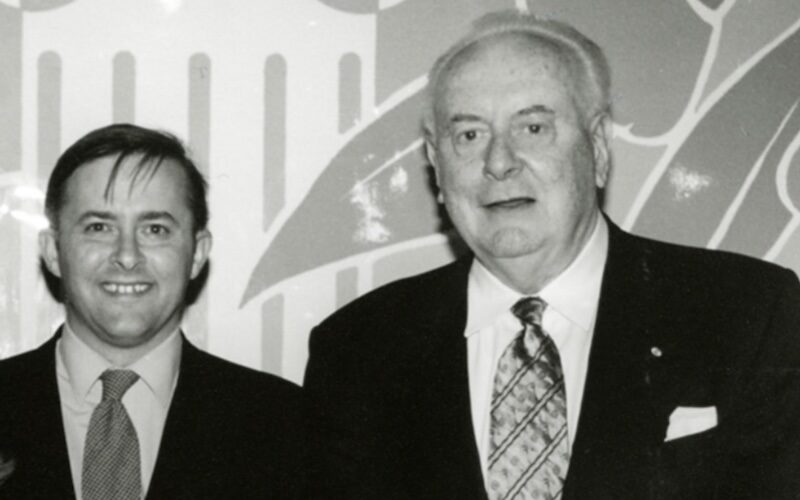From AUKUS to government secrecy, politics to policy, Australia’s PM Anthony Albanese is closer to Liberal PM Scott Morrison than Gough Whitlam, argues Paul Begley.
For reasons best known to himself, Australia’s Prime Minister Anthony Albanese last month gave a keynote speech at the launch of a new biography of Gough Whitlam authored by Troy Bramston. The author has also written biographies of Paul Keating, Robert Menzies and Bob Hawke, and worked for a time as a speech writer and adviser to Kevin Rudd when the latter was prime minister.
So, from one perspective at least, Bramston’s working life could be said to embody a catholicity of political perspectives. He could even be described as bipartisan, and there are few things more admirable in the Albanese political canon than being seen as bipartisan
That said, Bramston has worked for the past 15 years as a columnist and editor for Murdoch’s News Corporation broadsheet, The Australian.
For many decades, News Corp has been an implacable opponent of successive Australian Labor Governments, and especially the Whitlam Government, so much so that journalists working there in 1975 went on strike in response to the distorted newsroom campaign against Whitlam at the election that brought him down.
“Made in his image”?
Much of Albanese’s book-launch speech seemed counterintuitive in its references to the visionary attributes of Whitlam, as well as to the personal “forces that shaped his character”. Most curious was Albanese’s allusion to “the accounts of Cabinet and Caucus (which) make clear, perhaps more than any other Government in Australian history, that the Whitlam Government was made in its leader’s image.”
The surprise was not so much Albanese’s observation that Whitlam’s Government was made in his image, but that Albanese was bestowing praise on that idea in connection with Whitlam’s personal character as a visionary leader, and presuming to bask in the reflected glory of his position as Whitlam’s successor, now stamping his character on Caucus and Cabinet.
It prompts the question as to whether Albanese is content to see himself serving in Cabinet and Caucus as a first among equals, or as being in the process of making the present government in his own image.
While the full sweep of Whitlam’s vision failed in its audacious nation-building attempt with Rex Connor to nationalise Australia’s resources sector, it succeeded, among other things, in creating a universal healthcare scheme that has survived for half a century since its inception.
His government also introduced free tertiary education and no-fault divorce, withdrew Australian troops from America’s Vietnam War, and took the initiative in forming closer diplomatic relations with China.
Whitlam saw himself painting on a big canvas. Each brush stroke was bold, and no stroke seemed too big a risk to take.
Contrast with Whitlam glaring
Although the Albanese Government may increasingly become a government stuck in its leader’s image, the contrast with the Whitlam Government 50 years earlier could hardly be more glaring,
Albanese won office in 2022 on a risk-free small-target strategy marked by timidity and hesitancy on all fronts. The risks during that election were taken by The Greens and Teal Independents. They single-handedly discredited the then Morrison Government’s record on energy policy, gender equity, and corruption in government, and their voter preferences were crucial in boosting Labor’s lacklustre primary vote, enabling Albanese to win government.
As a public display of the forces that by 2022 had shaped Albanese’s character, no sooner had he took office than he personally cut the independents’ staffing allocation from four to one, which greatly minimised their capacity to be effective.
Under pressure, he then purposefully established an anti-corruption body without teeth, he sidelined environment minister Tanya Plibersek, ensuring that Labor decisions on fossil fuel approvals fitted as much as possible with the ideological perspectives of the Coalition and News Corp, and he adopted an unrelenting and open attack footing at the expense of The Greens.
On refugees
When the High Court decided that detention of refugees was illegal in November 2023, instead of welcoming the decision on humanitarian and legal grounds, Albanese overruled his Attorney General, Mark Dreyfus, who had defended the High Court,
and instead joined forces with the Coalition and News Corp,
by passing petty, draconian laws which validated the view that refugees were a special type of criminal that could never serve enough time for the offence of being a refugee.
At a time when a modicum of political leadership was required to support Australia’s most august legal institution, Albanese showed himself to be anything but a leader representing Labor values, but rather a follower of the likes of Scott Morrison and Pauline Hanson.
On Palestine
In June 2024, a Labor senator, Fatima Payman, called on the government to implement Labor policy by recognising the state of Palestine. For her trouble, she triggered an Albanese hissy-fit and was summarily ejected from Caucus. His Cabinet by then had adopted a faint-hearted approach to Israel’s response to the atrocities of October 2023, a response that was accurately described by John Howard as ‘pussyfooting’.
Albanese’s Foreign Minister Penny Wong made routine platitudinous calls on Israel to exercise ‘restraint’ as Gaza was reduced to rubble and many thousands of Palestinian civilians were incinerated in bombing raids or starved of food during a so-called ‘war’ in which only one side suffered death and casualties of any significance.
Albanese’s government continued to enable the sale of F-35 aircraft parts to Israel’s bloodbath machine, his foreign minister allowed the Israeli Ambassador to remain unchallenged in his post, and in a knee-jerk moment, appointed Jillian Segal as a special ‘antisemitism’ envoy on a $400,000 salary.
The Segal miss-step
It soon became apparent that his envoy’s immediate family funded Advance, an extremist far-right opponent of Albanese’s Labor government. It also became apparent that Segal’s first loyalty was to the state of Netanyahu’s Israel and that she equated antisemitism with any criticism of Israel, by then condemned by the International Criminal Court as a state under the leadership of war criminals.
To further demonstrate the folly of the appointment, in February 2025, the prime minister again overruled his attorney general by enacting hasty legislation against hate speech with a mandatory minimum sentence clause,
all to mollify an insatiable pro-Israel lobby.
More recently, the Albanese Government has been trying to push through legislation making freedom of information requests more expensive and difficult, a move which adds another degree of difficulty to anyone looking for evidence that his government is providing the transparency it promised following the trademark secrecy of the Morrison years.
Channelling Scomo on AUKUS
That became more evident with Albanese’s determination during his October visit to Washington to firmly establish himself in the mind of Donald Trump as another flunky by handing the school yard bully a $800 million cash gift and a America-First ‘deal’ on critical minerals.
They were mere sweeteners on top of the $368 billion gift of Scott Morrison’s AUKUS which massively boosts the coffers of the US military machine with no guarantees for Australia.
At a time when Trump is keen, like his presidential predecessors, to ensure that US wars are not played out on the north American mainland, Albanese has joined with the Coalition in rejecting a move to hold an inquiry into AUKUS.
Such an inquiry might look at the policy from perspectives such as loss of Australian sovereignty, reasonable likelihood of return on investment, and risk of making Australia a nuclear target of America’s enemies, of which there are increasing numbers.
Apart from squibbing on momentous policy matters such as Australian sovereignty and government transparency, other “forces” that appear to have “shaped the character” of Albanese were curious personal decisions that put on public display where he was coming from, or more likely where he wished he had come from. Two examples may suffice.
Qantas and Copacabana
As soon as he came to office in 2022, Albanese reportedly sought and was given stand-alone membership of the Qantas Chairman’s Lounge for his young son Nathan and his fiancée Jodie Haydon. Usually, a prize given to captains of industry at the discretion of the Qantas CEO at the time, it was a revealing wish come true for a newly installed Labor Prime Minister who, not long ago, had traded on being the poor son of a single mum.
In October 2024, the PM and his fiancée purchased a $4.3 million clifftop Copacabana home overlooking the Pacific Ocean on the NSW central coast. While there is nothing wrong with a couple buying a home to live in after their planned nuptials, the timing of the purchase by a Labor Prime Minister coincided with his government trying to cope with a national crisis on housing availability and affordability six months before an election, and raised contentious unanswered questions about negative gearing policy, depending on how the sale was arranged financially.
Unattributed remarks by Labor colleagues in the media suggested that many were baffled and dismayed by his untimely “splurge”.
“The optics are diabolical,” said former Liberal Party strategist Tony Barry, who compared it to PM Morrison’s secret Hawaiian holiday during national bushfires. Barry added that “one of the golden rules of leadership is that you just can’t do all the things you’d like to do. Like overseas holidays, like selling investment properties, like buying spectacular waterfront real estate.”
Liberal optics
If they were rules peculiar to Labor leaders, it seems Albanese no longer cared whether the voters saw him as a Labor leader who had promised that “no one would be left behind”. At roughly the same time as he made the Copacabana purchase, his Liberal Party opponent Peter Dutton had been allowed to offload a multi-million dollar Brisbane penthouse without attracting negative commentary in the media, as the ABC’s Annabel Crabb observed.
If Albanese was demanding to be judged according to the standard by which Liberal Party politicians are judged, was that because he saw his new station as prime minister now giving him permission to be forgiven, as Liberals often appear to be, for personal excesses?
For good reason, Labor Party leaders have long been held to a higher standard with respect to matters of personal enrichment. To get into office, Albanese may have traded on being among those “left behind” in his younger days, but his actions in the continuing present increasingly appear to be placing on display his satisfaction at having caught up.
A culture of leniency. Exposing wrongdoing or protecting wrongdoers?
Margaret Thatcher was once asked what her greatest legacy was as a Conservative Prime Minister. Her answer was Tony Blair. Scott Morrison may never be asked that question but were it ever put to him as the political architect of AUKUS, Robodebt and multiple ministries, following a corporate career pockmarked by a relentless appetite for secrecy, Morrison might well nominate Anthony Albanese as his greatest legacy.
Paul Begley worked in public affairs roles for three decades, most recently as general manager of government and media relations with the Australian HR Institute.

